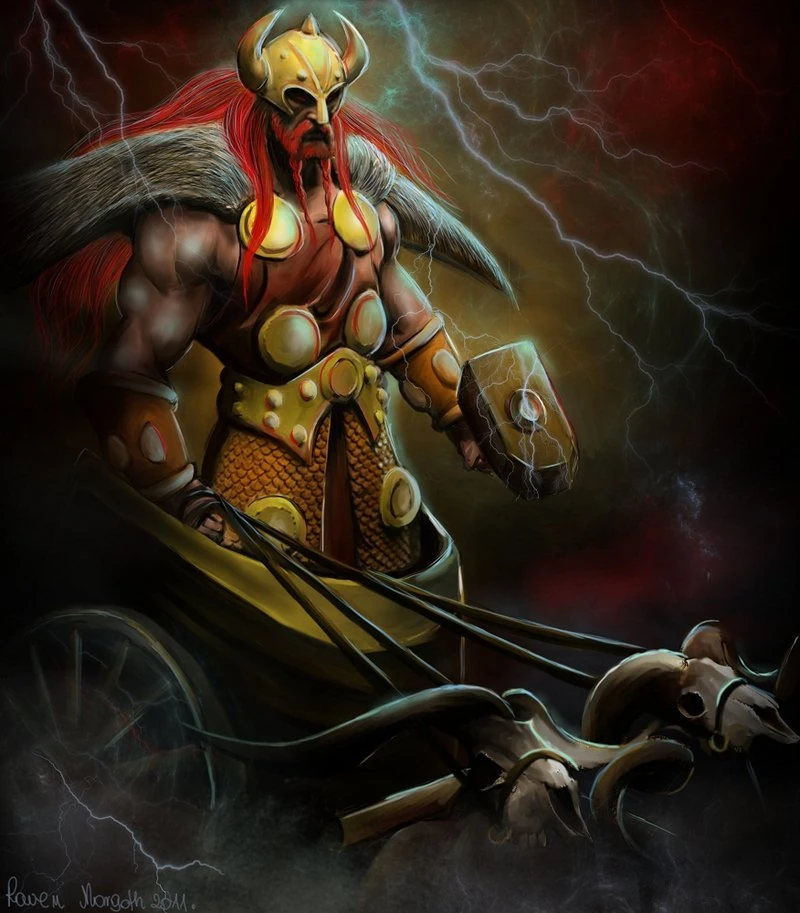
Giant made his escape he would have reason to rue that invitation. “Thor would gain little glory by killing an unarmed man,” said Rungnir; “but have you courage enough to fight with me at the boundary stones of Grjottunagard? I was a fool to forget my shield and whetstone at home, for if I had my weapons at hand we could fight it out at once; but if you kill me while I am unarmed, you will be every man’s byword for cowardice.” That was the first time any one had offered to stand against Thor in single combat, and so he immediately accepted the challenge. Rungnir rode off at top speed; when he arrived at home in Jotunheim, the Giants paid him the highest compliments on his courage. They realized, none the less, how much was at stake: if Rungnir, their most powerful champion, should be worsted, they might look for all manner of mischances. Accordingly they set about the task of making a man of clay, nine miles tall and three miles broad beneath the arms. They were unable to find a heart large enough for him until it occurred to them to make use of the heart of a mare. Rungnir for his part had a three-cornered heart of stone; his head also was of stone, and his shield as well. Taking his position behind his shield he awaited at Grjottunagard the corning of Thor; resting his whetstone on his shoulder, he presented a most formidable figure. The clay Giant, on the contrary, who bore the name Mokkurkalfi, was so terrified that “he made water as soon as he caught sight of Thor.” Thor came on the field seconded by Thjalfi. As they advanced Thjalfi called out, “You have made a reckless choice of position, Giant; Thor is closing in on you from below through the earth.” Rungnir then placed his shield beneath his feet and stood on it; no sooner had he done so than Thor, heralded by a burst of thunder and lightning, came upon the scene in all his Æsir might and from a great distance hurled his hammer at the Giant. Rungnir gripped his whetstone with both hands and threw it at Thor, but it struck the hammer in mid air and was shattered to pieces. One part fell to the, ground, and from these fragments have come all the mountains of whetstone; the other part, piercing Thor’s head, brought him to earth. The hammer struck Rungnir on the crown and smashed his skull to bits; he fell across the body of Thor so that his foot rested on Thor’s neck. By this time Thjalfi had won an easy victory over Mokkurkalfi. Neither Thjalfi nor any of the Æsir was able to lift Rungnir’s foot off Thor’s neck; but presently Magni came upon the field — the son of Thor and Jarnsaxa, a youngster of three years — and raised the Giant’s foot as if in play; it was unfortunate, so he said, that he had not come sooner, in which case he would have struck the Giant dead with his bare fist. Thor rose to his feet and praised his son handsomely; he avowed that the boy in time would amount to something, and by way of reward made him a present of Rungnir’s horse Goldmane. Odin, however, declared that Thor had not done right in giving so fine a horse to the son of a Giantess instead of to his own father.
Thor now returned to his home in Thrudvang, but the whetstone remained fixed in his head. To be rid of it he sought the aid of Groa, the wife of Aurvandil the Brave. The woman read magic spells over Thor’s head until the whetstone loosened its hold. When Thor noticed what was happening, he wanted to please the woman in his turn; so he told her that, on a journey to the north, he had once waded across the Elivagar carrying Aurvandil in a pannier out from Jotunheim. In proof of his story he related that one of Aurvandil’s toes, protruding out of the pannier, became so badly frostbitten that he was compelled to break it off; he then tossed it into the heavens, where it turned into a star that had since been called Aurvandil’s Toe. No long time would pass, he added, before Aurvandil returned home again. Groa was so happy at hearing his tale that she forgot all about her magic spells; the whetstone consequently was not fully loosened, and so still protrudes from Thor’s head. Therefore no whetstones must be thrown crosswise over the floor, for in that event the whetstone in Thor’s head will be set in motion.
Comments
Post a Comment